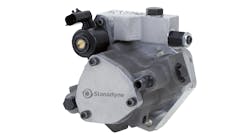Government Regulatory Compliance, LLC., a consulting firm in Reno, NV, recently announced that they had been selected to evaluate a new e-Commerce risk rating system developed by a group of private investors as a secondary screening measure for vendors, lenders and insurers within every aspect of the automotive aftermarket, including body shops, car dealerships, their vendors and insurance partners.
Slated to be effective in all 50 states by 2019, this new compliance credit rating will differentiate collision repairers in a significant way, according to Steven Schillinger, the lead consultant overseeing this venture. “This new scoring system is being established for suppliers, creditors and underwriters to help evaluate the risk of doing business in the ever-changing automotive aftermarket," he explained. "This rating, generally called round-robin rating, will indicate whether a shop may have additional low-risk disruptions that can result in costs.
"Regulatory agencies such as EPA, NFPA, PCI and OSHA have already established scoring standards for compliance attainment and every collision repairer is continually rated and measured," Schillinger said.
"Correspondingly, credit scoring bureaus have accepted scoring standards to indicate if a company will likely pay its bills. Like regulatory agencies, credit scores are available from bureaus like Equifax, Experian, and TransUnion that calculate ratings using mathematical models built by FICO."
These new ratings will be more important to body shops, especially after a recent court decision that took place earlier this year. "In the aftermath of the John Eagle Collision civil case where a couple was awarded $31.5 million for an improper repair on a Honda Fit, insurers are going to be more proactive about vetting shops," Schillinger said.
"They don't want the liability and they don't want to be associated with poorly rated shops, so these ratings are going to be used by insurers as part of their due diligence on a regular basis."
This new rating system will be available to the public, so consumers will be able to access the information as well, just like with credit ratings, Schillinger said. "There are some obvious similarities between credit scoring and compliance scoring. They are both based on various performance and historical data. In addition, they are both calculated using scoring models built around proven mathematical calculations. "However, there are important differences as well," he said. "Credit risk scoring models are built to predict the likelihood that a business may become delinquent in payments. The compliance risk scoring models, by contrast, are built to predict the likelihood that a company may become negligent in regulatory requirements. The Property and Casualty Insurers Association of America “PCI” recently posted new e-Commerce laws that expand access to insurance information by adopting electronic posting of insurance policies. Now there is a growing number of states that are embracing the idea of allowing consumers to have greater electronic access to automotive service and repair shops' insurance information."
Phil Troy, President of ComplyNet Corporation sees great value in this new e-Commerce risk rating system “Compliance ratings are used differently from the way a creditor would use a credit risk rating," he said. "For example, a compliance rating is most often just one of many factors used in an account evaluation. Most bankers and insurers use credit ratings along with inspection reports, permit and license history, city and state records and other kinds of information in their decision-making process."
These numbers speak volumes and will become more and more vital in the collision repair industry overtime, Troy said. "What kind of business do you own and operate? Are you operating in a compliant manner or cutting corners? With this new system, the good shops will excel while the shady operators will suffer. Insurance companies, paint companies, equipment companies and finally the customers themselves will be able to use these numbers to make decisions about whom to work with."
Schillinger said that top operators won't be concerned by this system, because they're already compliant and operating within the law, he said. "In this age of full transparency and accountability, this is the way things are going and those businesses that are already doing the right things will benefit from this system. But, shops and other automotive businesses that are continually cited or fined for not being compliant, they won't like this system."

